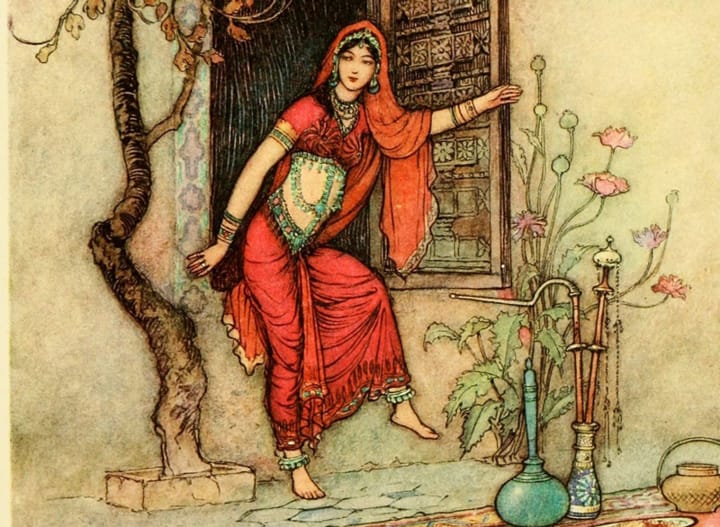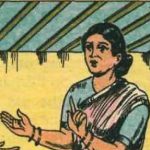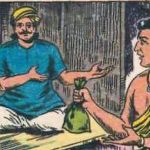There was a rich merchant who had an only son whom he loved passionately. He gave to his son whatever he wanted. His son wanted a beautiful house in the midst of a large garden. The house was built for him, and the grounds were laid out into a fine garden.
One day as the merchant’s son was walking in his garden, he put his hand into the nest of a small bird called toontooni and found in it an egg, which he took and put in an almirah which was dug into the wall of his house. He closed the door of the almirah and thought no more of the egg.
Though the merchant’s son had a house of his own, he had no separate establishment; at any rate, he kept no cook, for his mother used to send him his breakfast and dinner every day.
The egg that he deposited in the wall almirah one day burst, and out of it came a beautiful infant, a girl. But the merchant’s son knew nothing about it. He had forgotten everything about the egg, and the door of the wall almirah had been kept closed, though not locked, ever since the day the egg was put there. The child grew up within the wall almirah without the knowledge of the merchant’s son or of anyone else.
When the child could walk, it had the curiosity one day to open the door; and seeing some food on the floor (the breakfast of the merchant’s son sent by his mother), it came out, and ate a little of it, and returned to its cell in the wall-almirah. As the mother of the merchant’s son sent him always more than he could himself eat, he perceived no diminution in the quantity.
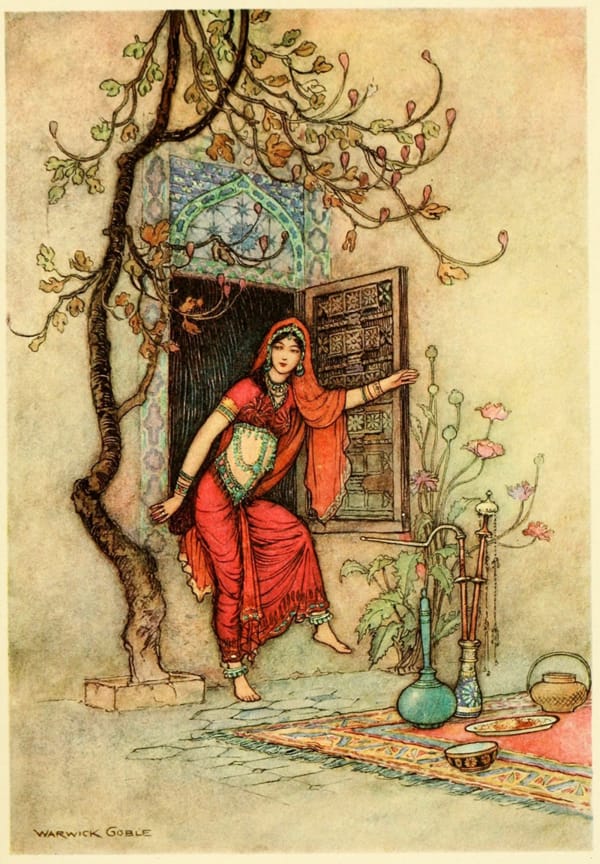
The girl of the wall almirah used every day to come out and eat a part of the food, and after eating used to return to her place in the almirah. But as the girl got older and older, she began to eat more and more; hence the merchant’s son began to perceive a diminution in the quantity of his food. Not dreaming of the existence of the wall-almirah girl, he wondered why his mother should send him such a small quantity of food.
He sent word to his mother, complaining of the insufficiency of his meals, and of the slovenly manner in which the food was served up in the dish; for the girl of the wall almirah used to finger the rice, curry, and other articles of food, and as she always went in a hurry back into the almirah that she might not be perceived by anyone, she had no time to put the rice and the other things into proper order after she had eaten part of them. The mother was astonished at her son’s complaint, for she gave always a much larger quantity than she knew her son could consume, and the food was served up on a silver plate neatly by her own hand. But as her son repeated the same complaint day after day, she began to suspect foul play. She told her son to watch and see whether anyone ate part of it unperceived.
Accordingly, one day when the servant brought the breakfast and laid it in a clean place on the floor, the merchant’s son, instead of going to bathe as it had hitherto been his custom, hid himself in a secret place and began to watch. In a few minutes, he saw the door of the wall almirah open; a beautiful damsel of sweet sixteen stepped out of it, sat on the carpet spread before the breakfast, and began to eat. The merchant’s son came out of his hiding place, and the damsel could not escape.
“Who are you, beautiful creature? You do not seem to be earth-born. Are you one of the daughters of the gods?” asked the merchant’s son.
The girl replied, “I do not know who I am. This I know, that one day I found myself in yonder almirah, and have been ever since living in it.”
The merchant’s son thought it strange. He now remembered that sixteen years before he had put in the almirah an egg he had found in the nest of a toontooni bird. The uncommon beauty of the wall-almirah girl made a deep impression on the mind of the merchant’s son, and he resolved in his mind to marry her. The girl no longer went into the almirah but lived in one of the rooms of the spacious house of the merchant’s son.
The next day the merchant’s son sent word to his mother to the effect that he would like to get married. His mother reproached herself for not having long before the thought of her son’s marriage and sent a message to her son to the effect that she and his father would the next day send ghataks (Professional match-makers) to different countries to seek a suitable bride. The merchant’s son sent word that he had secured for himself a most lovable young lady, and that if his parents had no objections he would produce her before them. Accordingly, the young lady of the wall almirah was taken to the merchant’s house; and the merchant and his wife were so struck with the matchless beauty, grace, and loveliness of the stranger, that, without asking any questions as to her birth, the nuptials were celebrated.
In the course of time, the merchant’s son had two sons; the elder he named Swet and the younger Basanta. The old merchant died and so did his wife. Swet and Basanta grew up fine lads, and the elder was in due time married. Some time after Swet’s marriage his mother, the wall-almirah lady, also died, and the widower lost no time in marrying a young and beautiful wife.
As Swet’s wife was older than his stepmother, she became the mistress of the house. The stepmother, like all stepmothers, hated Swet and Basanta with a perfect hatred; and the two ladies were naturally often at loggerheads with each other.
It so happened one day that a fisherman brought to the merchant (we shall no longer call him the merchant’s son, as his father had died) a fish of singular beauty. It was unlike any other fish that had been seen. The fish had marvellous qualities ascribed to it by the fisherman. If anyone eats it, said he, when he laughs maniks will drop from his mouth, and when he weeps pearls will drop from his eyes. The merchant, hearing of the wonderful properties of the fish, bought it at one thousand rupees, and put it into the hands of Swet’s wife, who was the mistress of the house, strictly enjoining her to cook it well and to give it to him alone to eat.
The mistress, or house-mother, who had overheard the conversation between her father-in-law and the fisherman, secretly resolved in her mind to give the cooked fish to her husband and to his brother to eat, and to give to her father-in-law instead a frog daintily cooked.
When she had finished cooking both the fish and the frog, she heard the noise of a squabble between her stepmother-in-law and her husband’s brother. It appears that Basanta, who was but a lad yet, was passionately fond of pigeons, which he tamed. One of these pigeons had flown into the room of his stepmother, who had secreted it in her clothes. Basanta rushed into the room and loudly demanded the pigeon. His stepmother denied any knowledge of the pigeon, on which the elder brother, Swet, forcibly took out the bird from her clothes and gave it to his brother.
The stepmother cursed and swore, and added, “Wait, when the head of the house comes home I will make him shed the blood of you both before I give him water to drink.”
Swet’s wife called her husband and said to him, “My dearest lord, that woman is a most wicked woman, and has boundless influence over my father-in-law. She will make him do what she has threatened. Our life is in imminent danger. Let us first eat a little, and let us all three run away from this place.”
Swet forthwith called Basanta to him and told him what he had heard from his wife. They resolved to run away before nightfall. The woman placed before her husband and his brother-in-law the fish of wonderful properties, and they ate of it heartily. The woman packed up all her jewels in a box. As there was only one horse, and it was of uncommon fleetness, the three sat upon it; Swet held the reins, the woman sat in the middle with the jewel box in her lap, and Basanta brought up the rear.
The horse galloped with the utmost swiftness. They passed through many a plain and many a noted town, till after midnight they found themselves in a forest not far from the bank of a river.
Here the most untoward event took place. Swet’s wife began to feel the pains of childbirth. They dismounted, and in an hour or two Swet’s wife gave birth to a son. What were the two brothers to do in this forest? A fire must be kindled to give heat both to the mother and the newborn baby. But where was the fire to be got? There were no human habitations visible. Still, fire must be procured—and it was the month of December—or else both the mother and the baby would certainly perish. Swet told Basanta to sit beside his wife, while he set out in the darkness of the night in search of fire.
Swet walked many a mile in darkness. Still, he saw no human habitations. At last, the genial light of Sukra (a bright star) somewhat illumined his path, and he saw at a distance what seemed a large city. He was congratulating himself on his journey’s end and on his being able to obtain fire for the benefit of his poor wife lying cold in the forest with the new-born babe, when of a sudden an elephant, gorgeously caparisoned, shot across his path, and gently taking him up by his trunk, placed him on the rich howdah on its back.
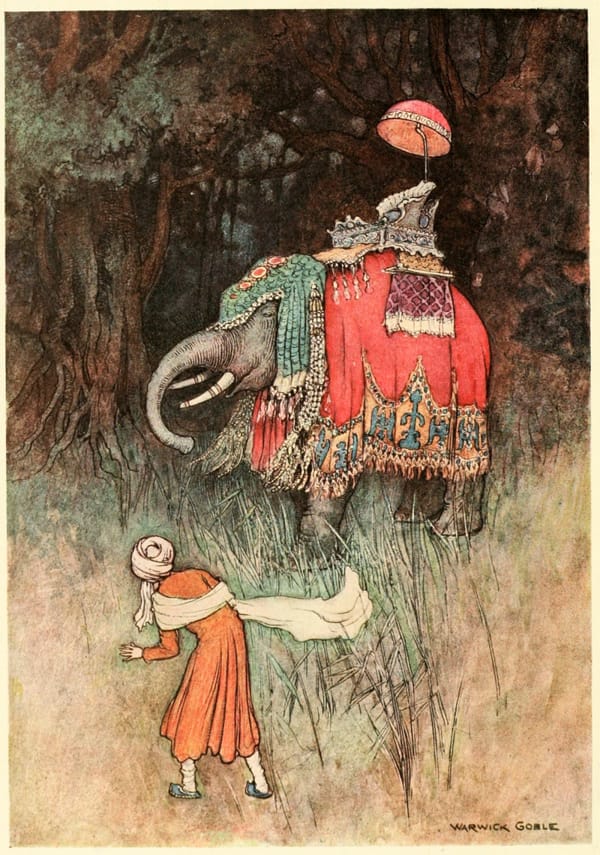
It then walked rapidly towards the city. Swet was quite taken aback. He did not understand the meaning of the elephant’s actions and wondered what was in store for him.
A crown was in store for him. In that kingdom, the chief city which he was approaching, every morning a king was elected, for the king of the previous day was always found dead in the morning in the room of the queen. What caused the death of the king no one knew; neither did the queen herself (for every successive king took her to wife) know the cause. And the elephant who took hold of Swet was the king-maker. Early in the morning, it went about, sometimes to distant places, and whosoever was brought on its back was acknowledged king by the people.
The elephant majestically marched through the crowded streets of the city, amid the acclamations of the people, the meaning of which Swet did not understand, entered the palace, and placed him on the throne. He was proclaimed king amid the rejoicings of some and the lamentations of others.
In the course of the day he heard of the strange fatality which overtook every night the elected king of those realms, but being possessed of great discretion and courage, he took every precaution to avert the dreadful catastrophe. Yet he hardly knew what expedients to adopt, as he was unacquainted with the nature of the danger. He resolved, however, upon two things, and these were, to go armed into the queen’s bed-chamber, and to sit up awake the whole night.
The queen was young and of exquisite beauty, and so guileless and benevolent was the expression of her face that it was impossible from looking at her to suppose that she could use any foul means of taking away the life of her nightly consort.
In the queen’s chamber, Swet spent a very agreeable evening; as the night advanced the queen fell asleep, but Swet kept awake, and was on the alert, looking at every creek and corner of the room, and expecting every minute to be murdered. In the dead of night, he perceived something like a thread coming out of the left nostril of the queen. The thread was so thin that it was almost invisible. As he watched it he found it several yards long, and yet it was coming out. When the whole of it had come out, it began to grow thick, and in a few minutes, it assumed the form of a huge serpent. In a moment Swet cut off the head of the serpent, the body of which wriggled violently. He sat quietly in the room, expecting other adventures. But nothing else happened. The queen slept longer than usual as she had been relieved of the huge snake that had made her stomach its den.
Early next morning the ministers came expecting as usual to hear of the king’s death, but when the ladies of the bed chamber knocked at the door of the queen they were astonished to see Swet come out. It was then known to all the people how that every night a terrible snake issued from the queen’s nostrils, how it devoured the king every night, and how it had at last been killed by the fortunate Swet. The whole country rejoiced at the prospect of a permanent king. It is a strange thing, nevertheless, it is true, that Swet did not remember his poor wife with the newborn babe lying in the forest, nor his brother attending to her. With the possession of the throne, he seemed to forget the whole of his past history.
Basanta, to whom his brother had entrusted his wife and child, sat watching for many a weary hour, expecting every moment to see Swet return with fire. The whole night passed away without his return.
At sunrise, he went to the bank of the river which was close by, and anxiously looked about for his brother, but in vain. Distressed beyond measure, he sat on the riverside and wept. A boat was passing by in which a merchant was returning to his country. As the boat was not far from the shore the merchant saw Basanta weeping, and what struck the attention of the merchant was the heap of what looked like pearls near the weeping man. At the request of the merchant, the boatman took his vessel towards the bank; the merchant went to the weeping man, and found that the heap was a heap of real pearls of the finest lustre: and what astonished him most of all was that the heap was increasing every second, for the tear-drops that were falling from his eyes fell to the ground not as tears but as pearls.
The merchant stowed away the heap of pearls into his boat, and with the help of his servants caught hold of Basanta himself, put him on board the vessel, and tied him to a post. Basanta, of course, resisted; but what could he do against so many? Thinking of his brother, his brother’s wife and baby, and his own captivity, Basanta wept more bitterly than before, which mightily pleased the merchant, as the more tears his captive shed the richer he himself became.
When the merchant reached his native town he confined Basanta in a room, and at stated hours every day scourged him in order to make him shed tears, every one of which was converted into a bright pearl. The merchant one day said to his servants, “As the fellow is making me rich by his weeping, let us see what he gives me by laughing.”
Accordingly, he began to tickle his captive, on which Basanta laughed, and as he laughed a great many maniks dropped from his mouth. After this poor Basanta was alternately whipped and tickled all the day and far into the night; and the merchant, in consequence, became the wealthiest man in the land. Leaving Basanta subjected to the alternate processes of castigation and titillation, let us attend to the fortunes of the poor wife of Swet, alone in the forest, with a child just born.
Swet’s wife, apparently deserted by her husband and her brother-in-law, was overwhelmed with grief. A woman, but a few hours since delivered of a child—and her first child, alone, and in a forest, far from the habitations of men,—her case was indeed pitiable. She wept rivers of tears. Excessive grief, however, brought her relief. She fell asleep with the newborn baby in her arms.
It so happened that at that hour the Kotwal (prefect of the police) of the country was passing that way. He had been very unfortunate with regard to his offspring; every child his wife presented him with died shortly after birth, and he was now going to bury the last infant on the banks of the river. As he was going, he saw in the forest a woman sleeping with a baby in her arms. He was a lively and beautiful boy. The Kotwal coveted the lovely infant. He quietly took it up, put in its place his own dead child, and returning home, told his wife that the child had not really died and had revived. Swet’s wife, unconscious of the deceit practised upon her by the Kotwal, on waking found her child dead. The distress of her mind may be imagined. The whole world became dark to her.
She was distracted by grief, and in her distraction she formed the resolution to commit suicide. The river was not far from the spot, and she determined to drown herself in it. She took in her hand the bundle of jewels and proceeded to the river-side. An old Brahman was at no great distance, performing his morning ablutions. He noticed the woman going into the water, and naturally thought that she was going to bathe; but when he saw her going far into deep waters, some suspicion arose in his mind. Discontinuing his devotions, he bawled out and ordered the woman to come to him. Swet’s wife seeing that it was an old man that was calling her, retraced her steps and came to him. On being asked what she was about to do, she said that she was going to make an end of herself and that as she had some jewels with her she would be obliged if he would accept them as a present. At the request of the old Brahman, she related to him her whole story. The upshot was, that she was prevented from drowning herself and that she was received into the Brahman’s family, where she was treated by the Brahman’s wife as her own daughter.
Years passed on. The reputed son of the Kotwal grew up a vigorous, robust lad. As the house of the old Brahman was not far from the Kotwal’s, the Kotwal’s son used accidentally to meet the handsome strange woman who passed for the Brahman’s daughter. The lad liked the woman and wanted to marry her. He spoke to his father about the woman, and the father spoke to the Brahman. The Brahman’s rage knew no bounds. What! the infidel Kotwal’s son aspiring to the hand of a Brahman’s daughter! A dwarf may as well aspire to catch hold of the moon! But the Kotwal’s son determined to have her by force. With this wicked object he one day scaled the wall that encompassed the Brahman’s house and got upon the thatched roof of the Brahman’s cow-house. While he was reconnoitring from that lofty position, he heard the following conversation between two calves in the cow-house:
First Calf. Men accuse us of brutish ignorance and immorality, but in my opinion, men are fifty times worse.
Second Calf. What makes you say so, brother? Have you witnessed today any instance of human depravity?
First Calf. Who can be a greater monster of crime than the same lad who is at this moment standing on the thatched roof of this hut over our head?
Second Calf. Why, I thought it was only the son of our Kotwal; and I never heard that he was exceptionally vicious.
First Calf. You never heard, but now you hear from me. This wicked lad is now wishing to get married to his own mother!
The First Calf then related to the inquisitive Second Calf in full the story of Swet and Basanta; how they and Swet’s wife fled from the vengeance of their stepmother; how Swet’s wife was delivered of a child in the forest by the river-side; how Swet was made king by the elephant, and how he succeeded in killing the serpent which issued out of the queen’s nostrils; how Basanta was carried away by the merchant, confined in a dungeon, and alternately flogged and tickled for pearls and maniks; how the Kotwal exchanged his dead child for the living one of Swet; how Swet’s wife was prevented from drowning herself in the river by the Brahman; how she was received into the Brahman’s family and treated as his daughter; how the Kotwal’s son grew up a hardy, lusty youth, and fell in love with her; and how at that very moment he was intent on accomplishing his brutal object.
All this story the Kotwal’s son heard from the thatched roof of the cow-house and was struck with horror. He forthwith got down from the thatch, and went home and told his father that he must have an interview with the king.
Notwithstanding his reputed father’s protestations to the contrary, he had an interview with the king, to whom he repeated the whole story as he had overheard it from the thatch of the cow-house. The king now remembered his poor wife’s case. She was brought from the house of the Brahman, whom he richly rewarded, and put her in her proper position as the queen of the kingdom; the reputed son of the Kotwal was acknowledged as his own son, and proclaimed the heir-apparent to the throne; Basanta was brought out of the dungeon, and the wicked merchant who had maltreated him was buried alive in the earth surrounded with thorns. After this, Swet, his wife and son, and Basanta lived together happily for many years.
Now my story endeth,
The Natiya-thorn withereth, etc.

